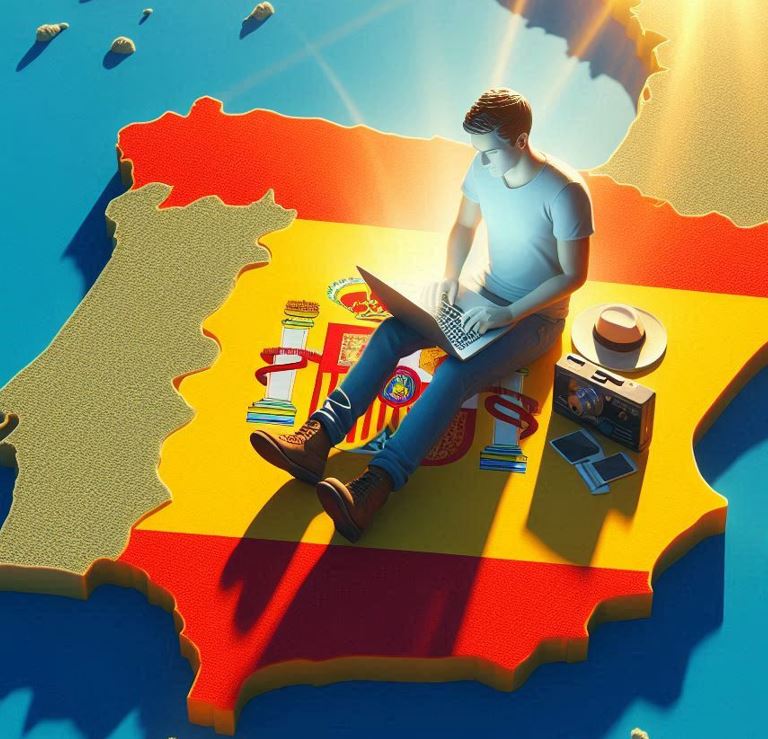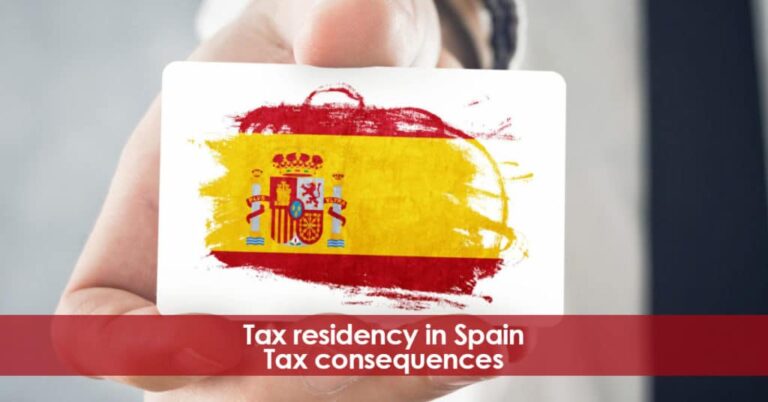Why Bring My Family With Me on Spanish Digital Nomad Visa is a Great Idea for Remote Workers?
If you’re wondering, “Can I bring my family with me on the Spanish Digital Nomad Visa?” you’re not alone. For many digital nomads, having family close by can make all the difference in a new place. Spain’s Digital Nomad Visa offers an incredible opportunity for remote workers who want to make Spain their home – and yes, that can include your family! In this blog, we’ll cover everything you need to know about relocating to Spain with your loved ones, how to prepare for the move, and what life might look like for your family as they adjust to a new city.
Marfour International Law Firm has excellent resources on this process that can simplify and guide your journey to sunny Spain.
Can I Bring My Family with Me on the Spanish Digital Nomad Visa?
The Spanish Digital Nomad Visa is a great opportunity for remote workers who want to experience life in Spain while continuing to work for clients or companies abroad. But if you’re planning to bring family along, there are specific rules and steps you’ll need to follow. Here’s everything you need to know to make the process smoother.

Who Qualifies as a Family Member?
When it comes to bringing family members to Spain, the Digital Nomad Visa has clear guidelines on who qualifies. Generally, eligible family members include:
- Spouse or Legal Partner: Your spouse or registered domestic partner can join you on the visa, which allows you both to live in Spain together.
- Children: Your dependent children, typically under 18, or adult children with disabilities, are allowed to join you.
- Dependent Parents: In certain cases, dependent parents may also be eligible, though this depends on financial dependence and other requirements.
For specific eligibility details and to ensure that your family meets all requirements, it’s helpful to consult with a legal expert like Marfour International Law Firm, who can guide you through each step of the application process.
Requirements for Bringing Family Members
Just as you need to meet certain criteria for your Digital Nomad Visa, your family members must also fulfill specific requirements. Generally, these include:
- Proof of Relationship: Official documentation showing the relationship between you and each family member is essential. This could be a marriage certificate for a spouse or a birth certificate for a child.
- Adequate Financial Resources: To bring family members, you’ll need to demonstrate that you have enough income to support them in Spain. This is usually calculated as a percentage increase in your required income, depending on the number of dependents.
- Health Insurance: Each family member needs valid health insurance that’s accepted in Spain. The policy must cover a wide range of medical services, as Spanish authorities are particular about this requirement for visa holders and their families.
How Long Can Family Members Stay?
Family members of Digital Nomad Visa holders can generally stay in Spain for as long as the visa is valid, which is typically one year, with the option to renew. The renewal process allows for longer stays, potentially up to five years in total. Each renewal requires updated documentation to prove ongoing financial stability, health insurance coverage, and continued work eligibility for the primary visa holder.
Marfour International Law Firm can provide guidance on renewing the Digital Nomad Visa and ensuring that family members can stay without any interruptions, helping you avoid common pitfalls in the renewal process.
Rights and Benefits for Family Members
Family members who come to Spain on a Digital Nomad Visa receive several benefits:
- Residency: They can live in Spain legally, enjoying the lifestyle, culture, and social benefits.
- Access to Education: Children can attend schools in Spain, including public, private, or international schools. Spain’s educational system offers a variety of options to cater to different needs and preferences.
- Healthcare: With private health insurance, family members can access a broad range of healthcare services across Spain. The Spanish healthcare system is known for its quality and accessibility, and many private plans allow family members to access both public and private facilities.
While family members have many benefits, they are generally not allowed to work in Spain unless they apply for their own work visa or permit. Marfour International Law Firm can help clarify any limitations and suggest potential pathways for family members who wish to pursue work opportunities in Spain.
How Long Does It Take to Settle into a New City?
Moving to a new city brings both excitement and challenges. It’s like opening a new chapter in your life with fresh places to explore, people to meet, and routines to establish. But how long does it actually take to feel settled? Many factors play a role, and Marfour International Law Firm often helps clients navigate the nuances of relocation. Let’s break down some key stages you might experience while finding your footing in a new place.
Finding Your Bearings
The first few weeks in a new city are usually all about adjusting to the basics. You’re figuring out the layout of your neighborhood, discovering where the nearest grocery store is, and getting used to public transport or new driving routes. This stage can feel a bit like you’re a tourist, even if you plan on staying long-term. Things that felt effortless back home—like knowing exactly where to go for your favorite foods—now require a little extra thought and research.
During this phase, Marfour International Law Firm advises making use of resources tailored to newcomers, such as local apps or expat networks. Even small wins, like finding a local café you enjoy, can start to make the city feel a little more like home. Typically, people feel more grounded after the first month or two as routines start forming.
Building a Social Circle
Meeting people in a new city can be both intimidating and rewarding. For most, a sense of belonging really starts to build when they form meaningful connections with others. Some people might find it easy to connect through work, while others rely on social groups, classes, or local meetups. Regardless of how you go about it, having friends to share your experiences with can make a huge difference.
It’s worth remembering that friendships take time to build. You might start feeling socially settled within three to six months, but lasting friendships often require a little more patience. Marfour International Law Firm often suggests that newcomers get involved in community events or activities that align with their interests, as this can create natural opportunities for meeting people with shared passions.
Adjusting to the Local Culture
Learning the nuances of a new city’s culture can take time, especially if you’re moving internationally. From understanding local customs to getting a feel for social etiquette, each city has its own vibe. You might notice differences in how people interact, even subtle things like the pace of life or attitudes toward work and leisure. This cultural adjustment is a gradual process and can vary greatly depending on your previous experiences and the specific city.
Marfour International Law Firm advises embracing these cultural differences with curiosity. Trying local foods, attending city events, or even practicing the language, if necessary, can help you feel more connected to your new home. Many people report feeling culturally adapted within a year, but it often depends on how actively they engage with their surroundings.
Creating Your Own Comfort Zone
One key to feeling settled is establishing personal routines. It’s all about creating a sense of normalcy that feels unique to you. Maybe you find a gym, join a local club, or set up a cozy corner at home that becomes your go-to reading spot. These routines provide stability and help anchor you in the new environment.
Experts at Marfour International Law Firm emphasize the importance of making your space feel like home. It could be something as simple as hanging photos of family or decorating with favorite colors. By creating a familiar environment, you’re more likely to feel a sense of belonging, even in an unfamiliar city.
Feeling Truly At Home
Ultimately, the timeline for feeling settled is unique to each person. For some, the process takes only a few months, while for others, it can take over a year. It often depends on your adaptability, the support systems you have, and the time you spend immersing yourself in the new place. Some people even find that the process never really “ends” since cities and their neighborhoods are constantly evolving.
Marfour International Law Firm reminds clients that the journey of settling in is personal and fluid. As you continue to adapt and grow, you may find that “home” isn’t just about a location but rather a mix of memories, routines, and connections.
How Do I Find the Right Housing for My Family?
Finding the right home for your family is a big step, and it can feel a bit overwhelming with so many factors to consider. But with the right approach, you can break down the process and feel confident in your choices. Here’s a practical guide on what to look for to make sure the home you choose really fits your family’s needs. As you go through these steps, remember that Marfour International Law Firm can assist with legal insights, especially when dealing with real estate laws and paperwork in your area.

Think About Your Family’s Needs and Lifestyle
Start by taking a moment to think about what your family actually needs in a home. Are you looking for extra rooms for a growing family or a backyard where the kids can play? Make a list of must-haves versus nice-to-haves. A good home will adapt to your daily life and offer a space where everyone can feel comfortable and at ease. Picture your family going about their day-to-day lives and imagine the layout and features that would make life a bit easier.
Choose a Location that Works for Everyone
Location is key in finding a family-friendly home. Think about proximity to schools, parks, grocery stores, and your workplace. Is the neighborhood safe and welcoming? Are there playgrounds or kid-friendly spaces nearby?
Take a few trips to the area at different times of day to get a feel for the community. This is where Marfour International Law Firm can come in handy if you’re looking at neighborhoods in a new city or country—they can provide you with valuable insights into local real estate laws, neighborhood zoning, and any upcoming developments that might affect your choice.
Set a Realistic Budget and Stick to It
While it’s easy to get excited about dream homes, keeping your budget in mind is essential. Think about what you can afford both now and in the future, and don’t forget about additional expenses like property taxes, maintenance, and any potential homeowners’ association fees. Marfour International Law Firm can help you understand any financial implications or legalities tied to purchasing a home, especially if you’re buying internationally. Knowing these details early on can help you make a sound decision without unexpected surprises.
Inspect and Compare Properties Carefully
When you start viewing homes, take your time inspecting each one. Look beyond the paint and décor to see the “bones” of the property. Are there signs of wear and tear? What’s the state of the plumbing, roofing, or electrical systems? If you’re unsure, don’t hesitate to bring in a professional for an inspection. Comparing multiple properties can also give you a better sense of what’s available in your price range. Having a clear-eyed view of each property will help you avoid homes that might need major repairs in the near future.
Consider the Future as Much as the Present
It’s not just about finding a house that fits now, but one that can adapt to your family’s future. Will the home grow with your family’s needs? Maybe you’re planning to expand your family, or perhaps you’d like an office space if remote work becomes a permanent arrangement.
A home that offers flexibility can save you from the hassle of moving again in a few years. With Marfour International Law Firm, you can get guidance on any property regulations or restrictions that might impact future renovations or expansions, ensuring that your choice of home remains a smart investment for years to come.
Finding the right family home involves careful thought and a bit of help along the way. By focusing on what matters to your family and getting the right legal advice from Marfour International Law Firm, you’re well on your way to finding a place that truly feels like home.
What Are the Educational Options for Children in Spain?
Choosing the right school for your children is a big part of settling into life in Spain. Fortunately, Spain offers a range of educational paths to suit different family needs, from public schools to private institutions. Here’s a look at the main choices for schooling in Spain.
Public Schools as an Affordable and Diverse Option
Public schools in Spain are funded by the government, making them a cost-effective choice for many families. Spanish is the primary language of instruction, though some regions, such as Catalonia and the Basque Country, also include regional languages in the curriculum. Public schools are ideal if you’d like your child to learn Spanish and integrate fully into Spanish society. These schools follow a curriculum set by the Ministry of Education and provide a well-rounded education that covers essential subjects and values.
Semi-Private Schools for a Balanced Approach
Semi-private schools, also known as concertados, are partially funded by the government and often charge a lower fee than fully private schools. These schools offer a mix of public and private education features, with some flexibility in curriculum choices and extracurriculars. Semi-private schools are a popular option among families who want additional academic or cultural programs but at a more moderate cost. These schools generally teach in Spanish, with some offering bilingual programs in English or other languages.
Private International Schools for a Global Perspective
For families who want an international curriculum, private international schools in Spain offer various options, such as British, American, or French programs. Classes are typically taught in English or the specific language of the curriculum, making these schools popular with expat families or those who plan to move internationally in the future. While private international schools come with higher fees, they offer curricula that align with the educational systems in other countries, which can ease transitions if your family relocates.
Bilingual Schools for Language Flexibility
Bilingual schools are becoming increasingly popular in Spain. These schools offer instruction in Spanish and English, or sometimes a third language, allowing children to become proficient in multiple languages. Bilingual education can help your child integrate into Spanish society while also building language skills that are valuable in a global context. Many bilingual programs are available in public, semi-private, and private schools, so families can find a suitable option at different budget levels.
Homeschooling and Alternative Education as Flexible Choices
While less common, homeschooling is legal in Spain, though it requires parents to register with the local authorities and follow certain guidelines. Homeschooling can be a flexible option for families who travel often or prefer an alternative educational approach. There are also alternative schools in Spain, such as Montessori and Waldorf schools, which focus on child-centered, holistic education. These schools are generally private and may have their own set of curricula that differ from mainstream options.
Spain offers a wide range of educational options to suit diverse family needs and cultural backgrounds. Whether you’re looking for an immersive Spanish experience, a bilingual curriculum, or an international perspective, there’s likely a good fit for your child’s education in Spain.
How Do Healthcare and Insurance Work for Families on a Digital Nomad Visa?
Healthcare is a critical factor for families moving to a new country. Fortunately, Spain has a reputable healthcare system, and visa holders have options for both public and private care.

Registering for Healthcare in Spain
Once you have your residence permit, you can register for public healthcare. This system is accessible and provides comprehensive care, though private insurance is also available for additional coverage.
Finding Family Doctors and Pediatricians
Spain offers a wide selection of family doctors and pediatricians. You can register with a general practitioner who can provide regular check-ups, vaccinations, and any referrals your family might need.
Health Insurance Requirements for Visa Holders
It’s important to have health insurance in place before arriving. Some digital nomad visa programs require proof of private health insurance to ensure coverage from day one.
FAQs
Can my children go to school in Spain if I’m on a Digital Nomad Visa?
Yes, children of Digital Nomad Visa holders can attend school in Spain. There are various public and private school options.
How many family members can join me on the Digital Nomad Visa?
While your spouse and children can join, other family members may require specific approval based on dependency status.
How much income is needed to bring my family on a Digital Nomad Visa?
Spain requires digital nomads to meet certain income thresholds to support themselves and their dependents, though the specific amounts vary.
Conclusion
Relocating to Spain with your family on the Digital Nomad Visa opens up an exciting new chapter filled with experiences for both you and your loved ones. From schooling options for children to healthcare access and community life, Spain is well-equipped to welcome families of remote workers. To make this process even smoother, Marfour International Law Firm provides helpful guidance, especially for managing legalities.






